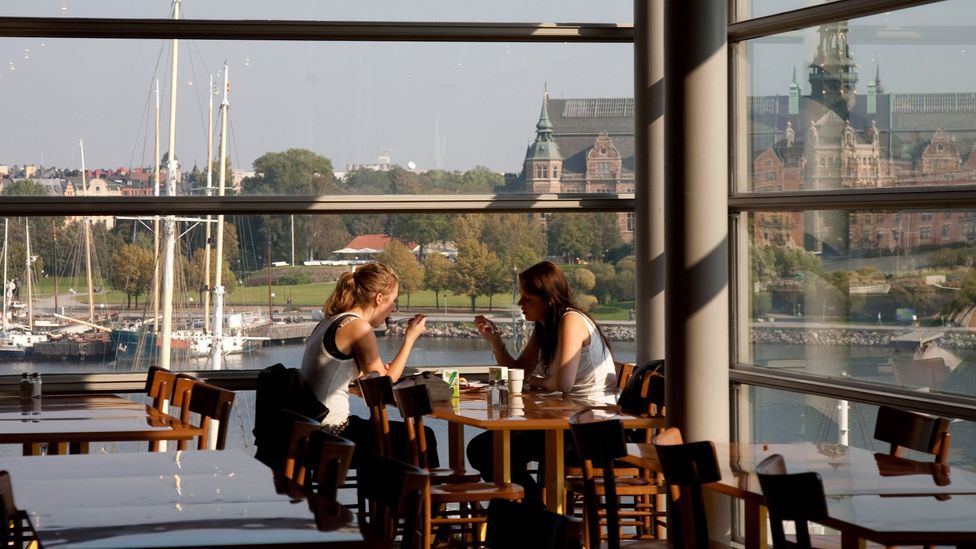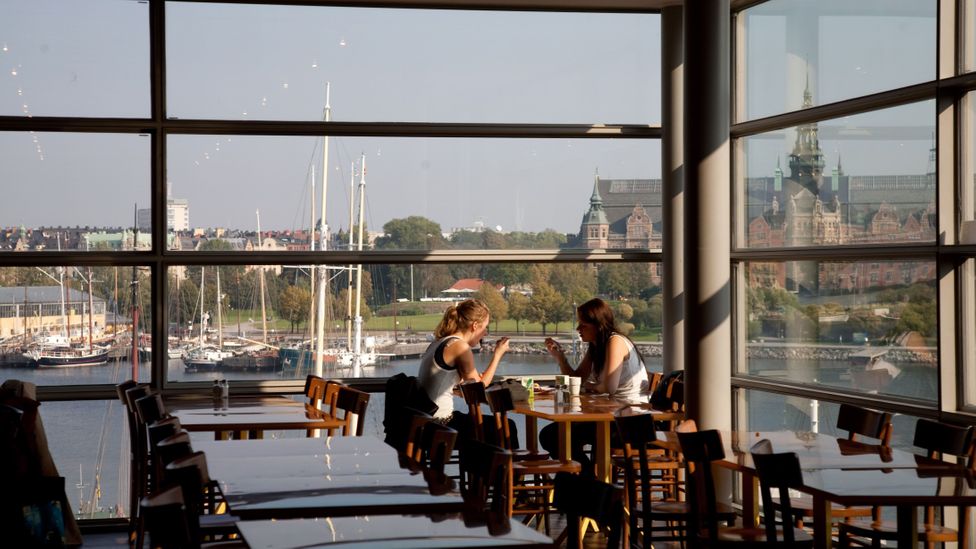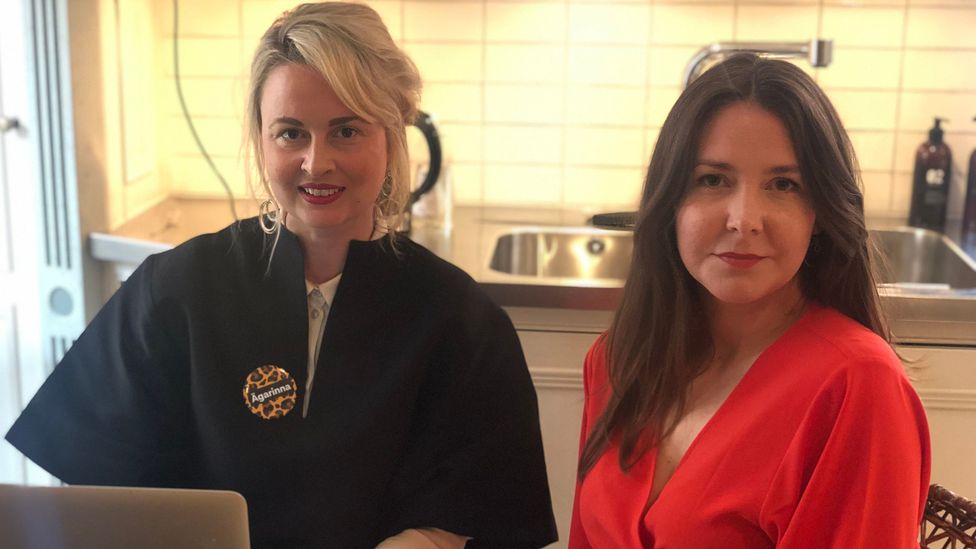When It Comes to Caregiving in a Family, Which of the Following Is False? Quizlet
The 'paradox' of working in the world's most equal countries
(Epitome credit:
Getty Images
)

Fifty-fifty Europe's virtually egalitarian countries struggle to put women on an even basis at work. In the Nordics, why do women notwithstanding lag backside men in pay, management and visitor ownership?
Due west
When Bolette Wrestroem moved back to Denmark later on spending virtually of her twenties overseas, she was excited to feel the "gender equality" for which the Nordic region is globally famous. At offset, she wasn't disappointed.
"I definitely call up Kingdom of denmark is more than open-minded than all the other places I accept lived," says the 28-year-old, now a community director for a Copenhagen offset-up. "There is more than focus on what you are capable of, instead of your gender."
But amidst immersion in a culture that seemed to actively champion women's rights, she couldn't escape the fact that in that location were still "primarily white males sitting at the top" of many of the best-known companies. Denmark's global paradigm, versus the reality, "didn't always lucifer upwards".
It is a paradox that many women working in the Nordics will recognise.
The region has a glowing reputation every bit the best place in the globe when it comes to gender equality, thanks to welfare states that support working families and promote parental leave, and legal, political and cultural support for the goal of gender equality.
But many experts argue that progress has flatlined, suggesting these countries are further from achieving equality than global observers might imagine.
"We do have the idea of being gender equal…just we have a long way to get earlier we are gender equal," argues Anneli Häyren, a researcher at the Middle for Gender Research at Uppsala University in Sweden. "I think it will take quite a lot of time - another 50 years at least - until we become there - and that is only if we keep working at it."
For Bolette Wrestroem, Kingdom of denmark'south global prototype as a leader in gender equality "didn't ever match up" with the reality in the workplace (Credit: Bolette Wrestroem)
Glass ceilings
Strong progress has been made in the public sector; in Sweden more women than men currently hold management positions in this sphere. In politics, 46% of Swedish members of parliament are women, while the proportion in other Nordic countries is around forty%.
Even so, there are still surprisingly few women in senior individual sector roles. But 28% of managers in Denmark are female person, rising to 32% in Finland and Norway, and 36% in Sweden, according to a report by contained think tank The Cato Institute in 2018. Iceland is the highest-scoring Nordic state, with 40%. Simply that is notwithstanding three points backside the US, where 43% of managers are women, despite the Us ranking just 51 in the Globe Economical Forum'southward Gender Gap alphabetize.
Strong concerns about this disparity were raised last yr in The Nordic Gender Effect at Work, a written report from the Nordic Council of Ministers, an informational body. The writers found "a troubling pattern" in businesses - "the higher up the hierarchy you look, the more than men you will see".
"Information technology feels more equal than in the US, considering people are more focused and consequent in talking most the topic...But I am non certain they are always held accountable in terms of upholding those ideals," agrees Dani Nguyen, 31, an executive recruiter based in the Swedish upper-case letter who previously worked in Silicon Valley.
When it comes to pay, the difference between gross average hourly earnings of male and female employees in Denmark, Republic of iceland and Kingdom of norway is only slightly below the EU boilerplate of sixteen%. In Finland the effigy creeps to 16.vii%. Sweden comes out all-time with 12.3%, merely even so lags behind Luxembourg, Italy and Romania, which all manage a pay gap of 5% or less.
Meanwhile, women in the Nordics trail their male counterparts in alluring investment for new businesses. Only 1% of investments registered in the Nordic Tech List database final year went to companies headed solely past female founders, co-ordinate to figures analysed by Swedish business organization news site DI Digital.
"It is definitely a problem," says Rikke Eckhoff Høvding, CEO of industry trunk The Norwegian Venture Capital and Private Equity Clan (NVCA). "It is easier to become VC funding if you lot are male. We take had this word a lot in the final few years and anybody is asking 'what we tin practice next?'."

Rikke Eckhoff Hovding says inspiring role models of female leadership are still really of import for making progress (Credit: Sigmund Sagberg Andersen)
Why has progress stalled?
Gender experts and campaigners are at odds over why the region continues to face these disparities.
One common caption is that women are more probable than men to choose public sector careers. This contributes to the pay gap (public sector jobs tend to pay less) and limits the pool of female person talent available for top private sector roles. Only the reasons women tend to pick these careers remain upwardly for contend.
Terminal yr, researchers in the U.s. and Uk found that countries with an existing culture of gender equality have an even smaller proportion of women taking degrees in science, technology and mathematics (Stem).
"It is a paradox … nobody would have expected this to be the reality of our time," says Professor Gijsbert Stoet, one of the written report's authors.
He argues that since Nordic countries take a generally high standard of living and potent welfare states, immature women are gratis to pick careers based on their ain interests, which he says are often more likely to include working in care-giving roles or with languages. By contrast, loftier achievers in less stable economies might choose STEM careers based on the income and security they provide, fifty-fifty if they prefer other areas.
"Girls and boys are different, and have dissimilar preferences on the whole," he argues. He believes likewise much media focus is placed on the lack of women in CEO positions, since these business relationship for such a minor proportion of jobs overall, and suggests that more men fill up these roles since "the personality traits and ambition to be important and famous is college in men than women".
But others strongly believe that social conditioning is the major driver when it comes to women'due south career choices and promotion opportunities, and stress that gender stereotypes persist.
"I don't call back it's about selection, it'south most structures … to say it's about selection is to 'blame the victim'," says Anneli Häyren at the Eye for Gender Inquiry at Uppsala University.
She argues that men remain better paid due to a greater value being placed on direction positions and in sure sectors, such as tech and science, which are "male person-gendered", in contrast to "female person-gendered" jobs focused on caregiving. She says men in professions like preschool teaching or nursing usually detect it easier to climb these career ladders than women inbound "male-gendered" areas. "Information technology is a waterproof sign of how strong the patriarchy is," she argues.
Häyren also rejects the idea that women in the Nordics are less aggressive than men. "Research suggests it is often a strategic conclusion not to use for certain roles…Women do want (it), just they realise that they won't get information technology."

The employment rate for women in the Nordic region is 72%, compared to an average of 59% across developed western countries (Credit: Getty Images)
Work-life residuum
Juggling a career with family life remains a challenge for some women in the Nordics, despite policies similar subsidised childcare and flexible working hours encouraging couples to share parenting.
While Nordic fathers practice take more parental exit than anywhere else in the world, the gender split of parenting labour remains far from equal. In Iceland and Sweden - which have the most generous policies - almost 30% of leave is taken by fathers, while in Norway the figure is simply over xix%, and the proportion drops to 11% in Kingdom of denmark and Finland, according to The Nordic Gender Effect at Piece of work study.
The report too flags two ongoing challenges; women are more probable to work function-fourth dimension and they invest more hours in housework or caring for elderly relatives than men. Many who can afford help choose not to, considering in that location is a degree of stigma attached to outsourcing household chores in Scandinavia. Even the region'due south most loftier-profile influencer and businesswoman, Isabella Löwengrip, faced criticism when she hired a personal assistant later on divorcing her married man.
"Men are more than active in family life...But women still feel split up between work and home and being a expert parent - even though nosotros are not in the 1950s anymore," reflects Anette Tvedergaard Madsen, 45, who has three children and holds a senior marketing role at one of Kingdom of denmark'south largest banks.
Madsen argues that most Nordic companies recognise the benefits of a diverse workforce and its importance when it comes to employer branding. "Yous want to be a modern system and an attractive workplace by creating diversity - not only male person and female but also different nationalities," she says.
But the marketing strategist believes that unconscious biases tin can impact senior hiring decisions.
"Men are definitely not trying to avoid women in top positions," she argues, merely "who they know best and who is sitting next to them" continues to play a role, as well as protecting their ain reputations.
Stockholm-based recruiter Dani Nguyen agrees. "Even in Sweden in that location is something of an 'old boys lodge', she argues. "The corporate environs has been built past white men and for white men."

Denmark and Sweden recently scored elevation marks in a World Bank study of how much laws limit discrimination in employment and entrepreneurship (Credit: Getty Images)
What tin be done?
Campaigners are proposing a broad range of solutions to move frontwards, including calls for individual company targets for senior managers or nationwide quotas. "If this isn't a KPI (central performance indicator) the business is held accountable for, it becomes a side hobby and side hobbies aren't always invested in financially or time wise," argues Nguyen.
Only critics of stock-still targets debate that the concept could devalue the style women hired under this regime are perceived in the workplace. Danish start-upwardly community managing director Bolette Wrestroem says quotas, while potentially a "proficient stepping-stone", could also propose that "women are just at that place because it is required and not because of their skills or capabilities".
Quotas for board members have already been introduced on a nationwide scale in Norway and Iceland. Merely equally The Nordic Gender Effect at Piece of work study points out, improvements at board level have non led to a leap in the number of women CEOs or managers. "I reason for this is that the concern world is characterised by a wide range of leadership standards and traits that are typically (perhaps stereotypically) associated with men," it concludes.
Nguyen says she has placed several women in high positions in Swedish head offices who ended up leaving because they felt they needed to adjust as well much to be heard. "The most important step is creating an environment where people of different backgrounds, ethnicity, gender, faith, sexuality, feel empowered and supported to practice their best," she argues. "We cannot just hire females and minorities and expect them to figure it out."
Many campaigners argue that educating male person employees on the benefits of diversity should be more prominent. Numerous global studies accept concluded that there is a positive correlation between the presence of women in leadership roles and an organisation's functioning.
The chief executive of Heba, a Stockholm rental company named-and-shamed for low male-female diverseness, recently made headlines for admitting he hadn't idea about the advantages of having more women managers until his peak executive team accomplished gender balance.
"I idea competence was the main thing - competence and attitude - not sex, but I've inverse my mind. The workplace works amend because of the [gender] mix," Lennart Karlsson told the BBC before long afterwards. "The word climate is amend, you have a better conversation and a better understanding for each other."
In Norway, a private equity firm criticised for a lack of female person managers recently introduced a policy making it mandatory for all fathers to accept at least ii months' parental leave, or risk losing their bonus, to assistance reduce unconscious bias.
"If I am a female and I look at the male team members around me becoming fathers and none of them have any parental go out, I will feel that I am an outlier when I get pregnant and I demand my parental get out," says Principal Operating Officer Morten Welo. "And so nosotros thought - 'permit's turn this effectually', and say information technology's mandatory regardless of gender."
He says the policy as well sends "an of import signal" that he hopes will encourage more than immature female person graduates to consider the company. "To attract the all-time talent, nosotros need better diversity."
More companies are also experimenting with digital platforms designed to assist tackle unconscious biases. Tengai, the world's first robot designed to carry out unbiased job interviews, is existence tested past major Swedish recruitment business firm TNG. In Norway, Equality Cheque, a community-based platform of employee reviews rating equality in companies (similar to the English-language Glassdoor platform), has become a popular tool for both applicants and 60 minutes professionals.
"Big funds have also become a lot more aware of how they write job descriptions - what words you lot utilize and how exercise yous conduct the interview processes," adds Rikke Eckhoff Høvding at the Norwegian Venture Capital letter and Private Equity Association (NVCA). "I would say no-1 knows the answers, so we need to attempt different things, readjust and think of something new if information technology doesn't work."

Charlotte Sundåker and Linda Waxin launched thinktank Ownershift, which aims to broaden discussion around greater gender equality through ownership (Credit: Maddy Savage)
Finding role models
On a political level, all the Nordic governments are working to tackle the gender gap.
Concluding twelvemonth Iceland became the showtime state in the earth to require companies with 25 or more workers to demonstrate that they pay men and women every bit for the same work, with daily fines for firms that fail to do and then.
Republic of finland's new Working Hours Human activity, due to come up into force in 2020, will requite the majority of full-time employees the right to determine when and where they work for at least one-half of their working hours, in a movement designed to aid boost flexibility.
Initiatives in Sweden include the recent launch of the Gender Equality Agency, designed to promote better coordination on the outcome, and coding lessons for children, partly aimed at tackling early biases in terms of tech-based career choices.
Meanwhile, many campaigners agree that grassroots efforts designed to empower women on an private level remain essential. "Role models are really important. Information technology's difficult to be what you can't see," argues Rikke Eckhoff Høvding. "But you tin visualise a career path and take risks if you run across others who have taken that path."
She says that the start-up community in Scandinavia is already making strides in this area, through encounter-ups, conferences and networking events targeting the gender gap. "Female founders are very bully to promote other female founders," she argues.
2 successful Swedish female entrepreneurs - Charlotte Sundåker and Linda Waxin - recently launched Ownershift, an contained think tank designed to expand discussions about gender equality to include buying and risk-taking. In Sweden, men still ain roughly double what women own in terms of capital, land, existent estate, forests and natural resources.
"We think that if more women create their own structures and companies, the overall structure will change into more than empathic systems," says Sundåker.
Staying in the spotlight
For Anneli Häyren, at the Middle for Gender Enquiry in Uppsala, a central goal is but to ensure that public discussions about gender equality go on, both in Nordic nations and on a global scale.
"On some level it really hit the brakes," she says of public discourse in recent years. "Quite a lot of people think we have discussed it enough and it is a dead debate."
Only she believes that raising sensation of the ongoing challenges in Sweden and the Nordics is essential, so that the region can pick upwards the pace of change and go on to inspire the world.
Source: https://www.bbc.com/worklife/article/20190831-the-paradox-of-working-in-the-worlds-most-equal-countries
0 Response to "When It Comes to Caregiving in a Family, Which of the Following Is False? Quizlet"
Post a Comment